- Home
- Steve Vernon
Wicked Woods Page 6
Wicked Woods Read online
Page 6
The two were a pair of lonely and angry men who worked their fields and lived only to fight with each other. Peregrine White was a tall, lanky stick of a man with a temper that snapped given any excuse. He had served with a Loyalist regiment during the Revolutionary War and had returned home to work his farm. It was no secret that Peregrine had a bit of a grudge against those who had not served in the war.
“All fat men, all soft men, sitting at home in the dark like great mucking cheeses,” Peregrine would say of any man who hadn’t fought in battle.
James Rogers, on the other hand, was a slow and sluggish kind of man. He was a heavy drinker with a surly disposition and a ten–dency towards brooding. He didn’t much care for Peregrine, and Peregrine returned the feeling with compound interest.
It was said that the two men had been keeping a feud simmering for many a year, just out of habit. Some folks blamed the grudge on a mistaken land claim that robbed one or the other of an acre or two of farmland. Other folks swore that the two of them were sim–ply a pair of irascible, abusive, and absolutely vindictive old coots.
“It’s all Peregrine’s fault,” Rogers averred. “Never trust a man who stands taller and leaner than his turnip hoe.”
“That fat old tosspot Rogers won’t get along with anyone,” Peregrine countered. “He’d as soon start an argument as draw a breath. And you can guarantee that both argument and breath will be equally foul.”
The trouble between the two of them came to a head on the afternoon of Saturday, September 22, 1810, as Peregrine White walked towards the town of Kingston on the long road that snaked its way around James Rogers’s property line.
It was a fine, clear day. The weather was suited for grinning or singing or just laying back under the shade of a tall silver birch tree, but Peregrine was carrying a load that was guaranteed to sour any man’s disposition. Peregrine was bent under the weight of a long-standing grudge that he’d fed and fattened for far too many years, and he was just aching to let it drop on some unsuspecting person’s head.
You see, for Peregrine White, all of life’s misfortunes began with someone else. As far as he was concerned there was never anyone else to blame but a neighbour or a stranger or a friend. He had a hard time dealing with anything that remotely resembled personal responsibility.
On this fine Saturday afternoon, Kipper, the small grey ter–rier who kept the Rogers’s farm safe from the depredations of the foxes, coyotes, and a few wandering black squirrels, was vigilantly patrolling his territory. In fact, any creature that was bold enough to cross over the Rogers’s property was bound to trigger the bark–ing instincts of this mangy grey terrier. Old Kipper yipped and yapped at anyone or anything passing by.
Who really knows why a dog barks? A sight or a sound or a strange scent can set a dog off at any particular moment in time. It’s a well-documented fact that dogs will even bark at spirits, and can keep half an eye peeled towards the invisible world. Then too, sometimes a dog will bark at its own tail or a shadow or a tree branch blowing in the breeze. Dogs don’t need much of an excuse to throw their two bits into any kind of a situation.
And this afternoon for whatever reason, little Kipper decided to bay and bark at Farmer Peregrine White.
“Bow-wow-wow, yourself,” Peregrine shouted. “Go find your front porch or I’ll stone you and feed your scrawny little carcass to my breeding sow.”
With that White stooped and quick as you could say “rock,” he picked up a chunk of New Brunswick granite and nailed the animal square in the side.
“That’ll fix you,” Peregrine said.
Kipper yelped like he’d been dropped tail-first onto a hot stove. His panicked yapping brought James Rogers to his front door on the double. He spied old Peregrine stooping for another bit of ammunition to pelt his dog with, and he charged out like a fat, galloping avenger of canine abuse.
“I have you now, White,” Rogers shouted, barrelling down his front path towards a calmly waiting Peregrine White. The man stood there, rock cocked in a blatant raised fist, grinning like he was enjoying himself. Finally, he’d found some fun.
“Come ahead then, Rogers,” Peregrine said. “I’ll bash what–ever brains remain in that besotted skull of yours.”
“You don’t scare me,” Rogers said, stopping his advance all the same.
“What’s it today, Rogers?” Peregrine asked. “Cider or whisky? Or have you saved up enough coppers to buy yourself some wine?”
With that last insult the two old buggers squared off like a pair of duelling gunfighters, showering each other with a deluge of well-flung curses and a spray of incidental spittle. The two men, loud at the quietest of moments, outdid themselves on this afternoon. Little Kipper kept yapping and barking all through the argument. The three of them together raised a clamour that could have easily awoken a dead man’s shadow.
Meanwhile, inside the farmhouse, not more than a few metres away from the argument in progress, young Mary Evans, who worked as a server for Rogers, heard the raucous quarrel–ling. Mary was busy at the time being amused by her fiancé, William Mascaline.
Mascaline, inspired by a boyfriend’s deep need to impress his girlfriend and a sense of honest indignation, ran out into the yard to try and separate the battling codgers. Or rather, he limped out. You see, as a result of a boyhood accident, William Mascaline walked with a pronounced and permanent limp that he was very sensitive about.
“Return to your house, Master Rogers,” Mascaline said, trying his best to remain polite to his fiancé’s boss. “And you, Mister White, had best be on your way.”
Unfortunately for Mascaline, old Peregrine was all too ready to take offence and find himself another target to vent his inesti–mable wrath upon. He turned upon Mascaline and tore him up one side and straight down the other. He insulted him in every way imaginable, even going so far as to ape Mascaline’s limp in a mean and nasty fashion.
“Stump boy,” Peregrine called him, hobbling along in an exaggerated way. “Humping and stumping, where’d you learn to walk?”
However, Mascaline kept his cool, repeating his advice time and again.
“You really need to go home, Mister White,” he said. “Why waste your day ranting at me and this farmer and this poor little terrier?”
Realizing that his efforts at humiliation were being wasted upon William Mascaline, Peregrine White turned his anger upon young Mary Evans.
“That fiancée of yours, that scullery slattern, that trollop and tray-toter. Do you really think she loves you?” On and on, building like a rolling tidal wave, Peregrine White heaped abuse on Mary.
That did it.
While William Mascaline could let insult after insult slide from his back like rainwater off a mallard’s feathers, there was no way in tarnation that he was going to put up with someone insult–ing his Mary.
“Mister Peregrine White,” Mascaline said, his voice becom–ing low and more menacing. “If you don’t leave my sight and my earshot right this minute, I will knock you down with my bare hands.”
“Bravo, bully,” Peregrine taunted, “threatening an old man. What fine manners you show your fiancée.”
Mascaline spat in the dirt.
“That terrier has more manners than you, sir,” Mascaline said, “and he’s a fair sight better looking.”
“I’ll stone you, boy,” Peregrine said, hefting his rock and drawing a breath for a fresh new tirade. “In fact, if I had a mus–ket I’d blow out your mealy young brains for showing me such impudence.”
And then he threw the rock, winging it off of Mascaline’s bad leg. That was definitely the straw that broke the camel’s back. Mascaline turned and ran back to the farmer’s house and hunted up Rogers’s old musket. It was a dirty thing, rusted and uncared for. It looked as if it might just as well blow up in Mascaline’s face as fire.
“Here’s your musket, Master White, sir,” Mascaline said. “You may fire if you have the courage for it.”
Ah, the brash foolishnes
s of youth mixed with the bitter anger of age makes for a very bad brew indeed. Peregrine White took the musket and eyed it with an ex-soldier’s critical observation.
“You keep as bad a care of your weapons as you do of your house, Rogers,” Peregrine said. “I’m in as much danger from shooting myself with such a weapon.”
“Damn you, sir,” Rogers huffed. “Use that weapon or I will use it myself.”
Peregrine White put the musket to his shoulder.
“Mind you, boy. I’ve killed bigger men than you, back in the war,” Peregrine warned.
“The war was a long time ago, old man,” Mascaline answered. “The lies and brags you make of it mean nothing more than the wind.”
“Better you use this musket for a crutch, gimp-a-leg,” Peregrine said cruelly. “It probably isn’t even loaded.”
Rogers, who was a little loaded himself even this early in the morning, was hair-trigger quick to speak up. “And what good is a weapon, if it isn’t loaded? It’s primed and ready sir. Are you?”
There’s nothing so foolish as those who will listen to a double-dog dare.
Peregrine threw the musket back at Mascaline. “I need no gun to tell you what I think of you and that serving wench you hope to bed.”
With that Peregrine launched himself into a fresh torrent of insults. Mascaline stood there taking it all in, hanging onto the musket, his fists white-knuckled with rage.
And then, all at once, as if by accident, the musket thun–dered out a gout of black powder. Mascaline had been holding it loosely, aimed towards the ground, but just the same Peregrine fell to the dirt, his left leg holed brutally midway between his ankle and his knee.
“I’ll show you how to limp,” Mascaline was heard to say.
Mary Evans came flying off the front stoop and knelt beside the fallen Peregrine, bandaging the old coot’s leg with a swatch of fabric torn from her only courting dress.
Whether it was simply human courtesy, or the fear of losing her lover to the gallows, Mary Evans was determined that old Peregrine would not suffer. She patched him up as best as she could, but there was nothing to be done. Infection set in, and on Wednesday, October 3, 1810, old Peregrine White muttered his last bitter insult and passed away.
William Mascaline was arrested and charged with cold-blooded murder. He faced trial at the Kingston courthouse on October 30, 1810. One day before Halloween, Judge Ward Chipman Sr. sentenced William Mascaline to hang, and six days later, hang he did.
Mary never married and James Rogers never repented his temper. Kipper ran away on the day of the trial, although some believe that Rogers simply shot and killed the terrier, thus putting an end to the sole reminder of his uncontrollable rage.
Not a lot of folks know about this trial, but there are many who tell you that on Halloween nights in the woods outside of Kingston you will often hear a small dog barking in the wind. Others will tell of hearing the voices of two bitterly angry old men arguing in the empty night.
And there is many a Kingstonian who has heard and seen the ghost of Mary Evans walking the lonely woods, weeping for her long-lost lover. Her tears mix freely with the evening mist, and the night wind blows lonely and sorrowful and full of regret.
11
THERE WILL
BE BLOOD
CATONS ISLAND
In the first month of 1611, a pair of Jesuit missionaries, Pierre Biard and Enemond Masse, set sail from France and arrived at Port Royal, Nova Scotia, the first permanent French settlement in Canada. Port Royal was built on the site of modern-day Annapolis Royal. You may remember that it served as a base for Sieur D’Aulnay Charnisay, the archrival of Charles La Tour and his wife Madame La Tour.
The two missionaries, Biard and Masse, were under the orders of the king’s confessor to take charge of the Jesuit mission in Acadia. It was a rough job, but France had confidence in the men they had chosen.
In the summer of 1611, the two men, accompanied by a crew of hardy St. Malo traders, set sail up the St. John River to a tiny little island called Emenic, just off of Long Reach. Nowadays they call this place Catons Island but back in the seventeenth century it was nothing more than a rung on a long ladder leading inland to future trading grounds. The traders hoped to establish a perma–nent trading base on the island, while the missionaries planned to meet with local holy men and get to know the Maliseet.
The journey down the St. John River was a rough one, but Biard and his men were seasoned travellers. Still, this was a strange and dark country to them. All along the riverside the trees bowed down their heads, and the wind whistled through the branches, and the black flies and mosquitoes buzzed incessantly. They saw bear and moose and other creatures they did not recognize. Fish jumping in the river’s waves startled them, and at every turn they felt the for–est breathing about them as if in anticipation of a coming feast.
The travellers were still a league and a half away from Catons Island when the sun called it a day and nighttime rolled on in. The stars were just beginning to peek out of the darkness when all at once a part of the northern sky turned a bright blood red. As if the sky were burning down, this light spread in vivid streaks and flashes, until the shining glow completely encompassed the nearby Maliseet settlement.
Biard remarked “the red glow was so brilliant that the whole river was tinged and made luminous by it. The apparition lasted about five minutes and as soon as it disappeared another came from the same direction, with the same form and appearance.”
Of course, it is very probable that this phenomenon was noth–ing more than an early sighting of the aurora borealis, or the northern lights. However, the Maliseet came to the missionaries and pointed up at the bright shimmering radiance, crying out, “Gara, gara, maredo.” According to Biard their warning translated as: “We shall have war. There will be blood.”
We might file that dubious translation in the same sector as the guides who thought Kanata was the name of the country they were travelling in, rather than a First Nations term for a village or cluster of houses.
According to all descriptions the light radiated across the entire sky. The Maliseet swore that it was a spirit warning them of oncoming danger, and perhaps they were right.
Biard’s band of travellers was decidedly unnerved by the occur–rence. They met with the settlers at Catons Island, and an argu–ment and battle nearly ensued.
The settlers, panicked by the sight of the eerie light mistook Biard’s men for a group of bandits.
In Biard’s words, “What a night this was; for it passed in con–tinual alarms, gun shots and rash acts on the part of some of the men.”
They were worried that the Maliseet’s prediction, inspired by the omen in the night sky above, would have its bloody fulfillment on the earth below. The night was spent in sleepless terror and in the morning, in an effort to re-establish some sense of order and a little hope, Biard performed what was very likely the first ceremony of the holy mass in the province of New Brunswick. His men bowed their heads and prayed, and for a time peace was found.
Yet as he looked down into the chalice filled with the holy sac–ramental red wine all that Pierre Biard could see was that burning sky of blood that had looked down grimly from the heavens above the missionaries. He kept his head bowed and prayed just as hard as he could.
Two years later, Biard was captured during the destruction of the Nova Scotia settlements of Saint Sauveur and Port Royal by an invading British military expedition from Virginia. Noted sea raider Samuel Argall led the expedition. The fort at Port Royal was looted and burned to the ground. Eyewitnesses swore that the sky burned red that night and for many nights to follow.
Biard was captured and taken to Jamestown, where he barely avoided being hanged, before being transported back to France and framed for the instigation of this raid. He finally managed to clear his name of all dishonour and afterwards made a life for himself working as a missionary in the south of France. He became renowned as a professor of theology and was made
mili–tary chaplain in the armies of the king. He died of natural causes at Avignon, France, in 1622 at the age of forty-six.
I wonder if the blood and the war that the Maliseet natives prophesied was some sort of a forerunner of the destruction of Port Royal? Or is it possible that the natives were only having a laugh at the missionary’s expense, playing up a natural phenom–enon and doing their best to terrify the foolish white men?
In any case, Port Royal was looted and burned in November 1613. De Poutrincourt, the sieur at the time, was discouraged enough to return to France and transfer all of his North American holdings to his son. De Poutrincourt died around 1623 and bequeathed his possessions to one Charles La Tour.
Funny how these things all come around, isn’t it?
12
GHOST HOLLOW
CARTERS COVE
There are an awful lot of ghosts around in old New Brunswick and this spectral population is reflected in the etymology of the region. On any map you’ll see such places as Ghost Hollow, Ghost Island, Ghost Hill, Ghost Lake, and Ghost Rock. I’ve done my level best to track down the stories behind each of these names, but have so far only found the tales of Ghost Rock, Ghost Hollow, and Ghost Hill. I will continue to keep hunting for the ghost stories that must surely lie behind Ghost Island and Ghost Lake.
I heard this next tale from a New Brunswick schoolteacher by the name of Darren White. He told me the bare bones of the story and I have fleshed it out as best as I can.
Ghost Hollow is an awfully hard place to find on a map.
If you leave the city of Saint John, heading west towards Fredericton and take the Grand Bay exit, you will come to the Westfield Ferry. The ferry is located next to Westfield Beach, and makes the five-minute ride connecting Grand Bay–Westfield and Hardings Point.

 Flash Virus: Episode One
Flash Virus: Episode One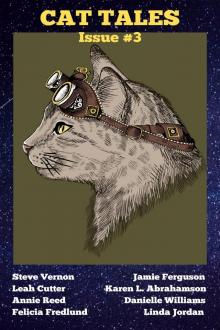 Cat Tales Issue #3
Cat Tales Issue #3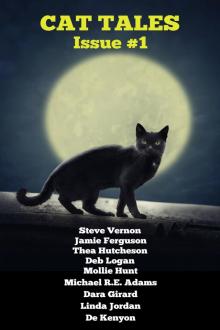 Cat Tales Issue #1
Cat Tales Issue #1 A Fine Sacrifice
A Fine Sacrifice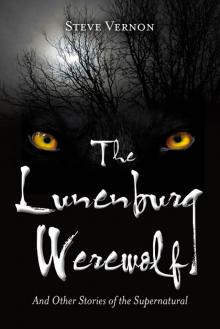 The Lunenburg Werewolf
The Lunenburg Werewolf October Tales: Seven Creepy Stories (Stories to SERIOUSLY Creep You Out Book 1)
October Tales: Seven Creepy Stories (Stories to SERIOUSLY Creep You Out Book 1)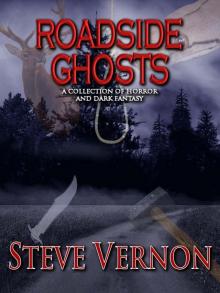 Roadside Ghosts: A Collection of Horror and Dark Fantasy (Stories to SERIOUSLY Creep You Out Book 3)
Roadside Ghosts: A Collection of Horror and Dark Fantasy (Stories to SERIOUSLY Creep You Out Book 3) Haunted Harbours
Haunted Harbours Wicked Woods
Wicked Woods Two Fisted Nasty: A Novella and Three Short Stories (Stories to SERIOUSLY Creep You Out Book 2)
Two Fisted Nasty: A Novella and Three Short Stories (Stories to SERIOUSLY Creep You Out Book 2) A Hat Full of Stories: Three Weird West Tales (Stories to SERIOUSLY Creep You Out Book 9)
A Hat Full of Stories: Three Weird West Tales (Stories to SERIOUSLY Creep You Out Book 9) Bad Valentines: three twisted love stories (Stories To SERIOUSLY Creep You Out Book 7)
Bad Valentines: three twisted love stories (Stories To SERIOUSLY Creep You Out Book 7) Do-Overs and Detours - Eighteen Eerie Tales (Stories to SERIOUSLY Creep You Out Book 4)
Do-Overs and Detours - Eighteen Eerie Tales (Stories to SERIOUSLY Creep You Out Book 4)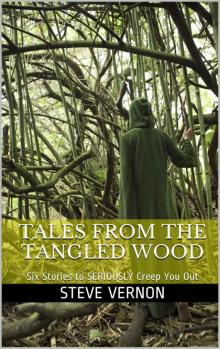 Tales From The Tangled Wood: Six Stories to SERIOUSLY Creep You Out
Tales From The Tangled Wood: Six Stories to SERIOUSLY Creep You Out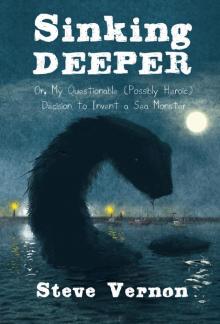 Sinking Deeper
Sinking Deeper Bad Valentines 2: Six Twisted Love Stories (Stories to SERIOUSLY Creep You Out Book 5)
Bad Valentines 2: Six Twisted Love Stories (Stories to SERIOUSLY Creep You Out Book 5)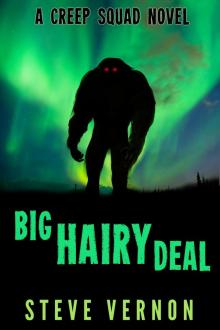 Big Hairy Deal
Big Hairy Deal Maritime Murder
Maritime Murder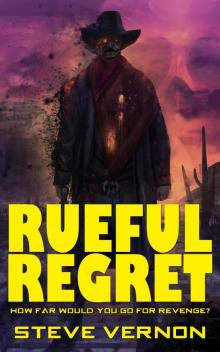 Rueful Regret
Rueful Regret